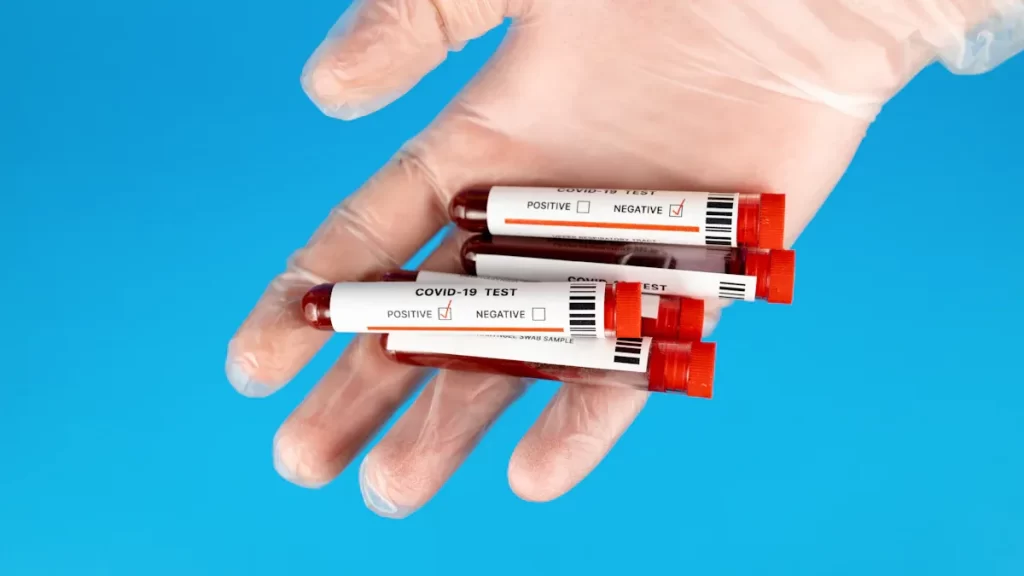News & Events
What Anti Double Stranded DNA Antibody Results Mean for Your Health
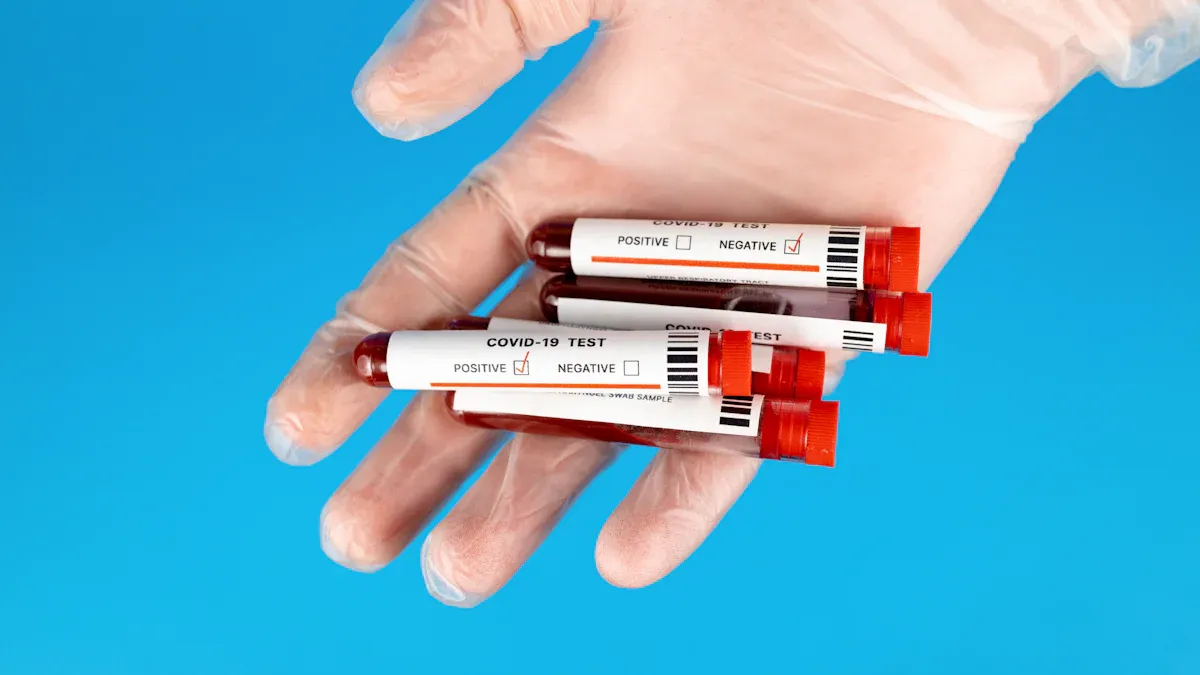
You may feel worried when you see your anti double stranded dna antibody test results. This test helps doctors find and watch autoimmune diseases like lupus. Many people with lupus test positive for these antibodies:
- About 70% of lupus patients have positive anti-double stranded DNA antibodies.
- Even when another lupus test is negative, almost 69% still show positive anti-dsDNA.
| Test Use Description | How Often Used for Lupus | Notes |
|---|---|---|
| Used to diagnose and check lupus | High | Important for patients with lupus symptoms and positive ANA |
| Helps track lupus activity and flare-ups | Periodic | Especially key for lupus kidney problems |
Understanding your results can help you and your doctor decide what happens next.
Key Takeaways
- A positive anti-dsDNA test often indicates lupus. About 70% of lupus patients test positive for these antibodies.
- Doctors use the anti-dsDNA test to diagnose lupus and monitor disease activity. Regular testing helps track changes in your health.
- Even if your anti-dsDNA result is negative, you may still have lupus. Many patients with lupus can test negative for these antibodies.
- Discuss your test results with your doctor. Understanding your results can help you make informed decisions about your health.
- If you have symptoms like joint pain or fatigue, ask your doctor about getting tested for anti-dsDNA antibodies.
Anti Double Stranded DNA Antibody Test
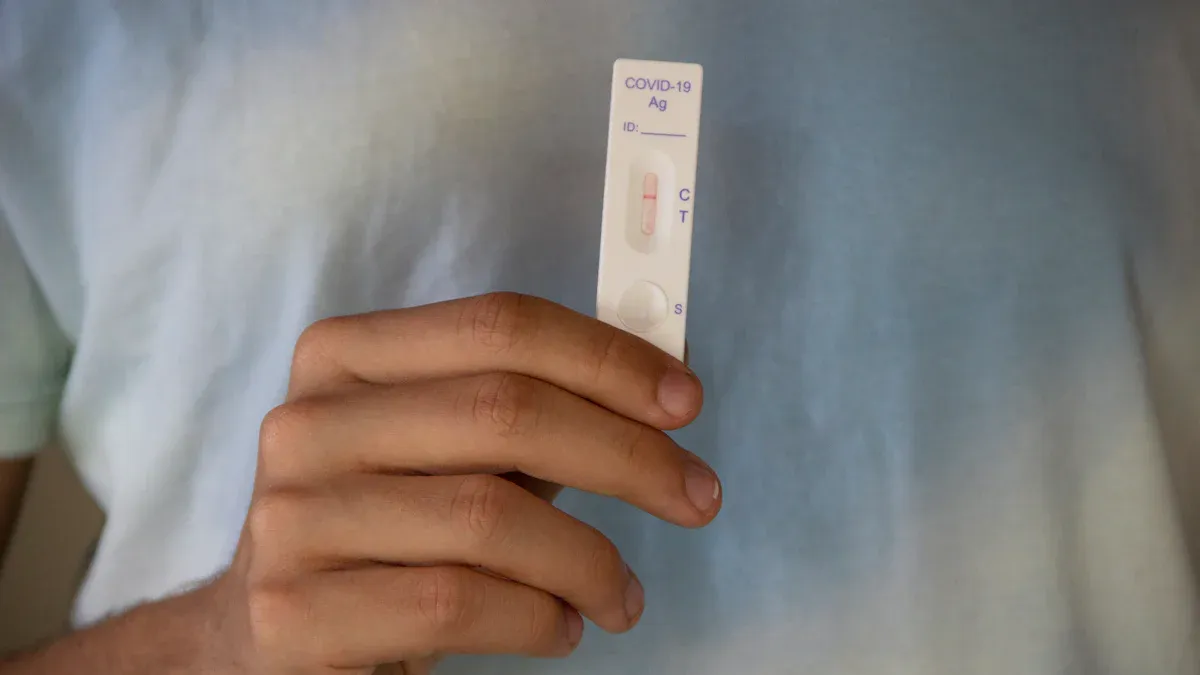
What It Measures
You may wonder what the anti double stranded dna antibody test actually checks in your blood. This test looks for anti-dsdna antibodies, which target your own DNA. Doctors use this test to help with the diagnosis of sle and other autoimmune diseases. The anti-dsdna antibodies are important markers for sle. The test can measure different types of antibodies and their levels. Some methods, like the Farr assay, detect high avidity anti-dsdna antibodies, which are very specific for sle. You may see your results reported as levels of these antibodies. The enzyme-linked immunosorbent assay, or elisa, is a common way to measure anti-dsdna. Other methods include clift and radioimmunoassay.
Here is a table showing what the test measures:
| Component/Marker | Description |
|---|---|
| Anti-dsDNA antibodies | Antibodies that specifically target double-stranded DNA, significant for diagnosing SLE. |
| High avidity anti-dsDNA antibodies | Detected using the Farr method, known for its specificity in identifying dsDNA autoantibodies. |
| Elevated dsDNA autoantibody levels | Confirm the diagnosis of systemic lupus erythematosus (SLE) and predict disease activity. |
You can see that anti-dsdna antibodies are much more common in people with sle than in healthy people. The chart below shows how often these antibodies appear in different groups:
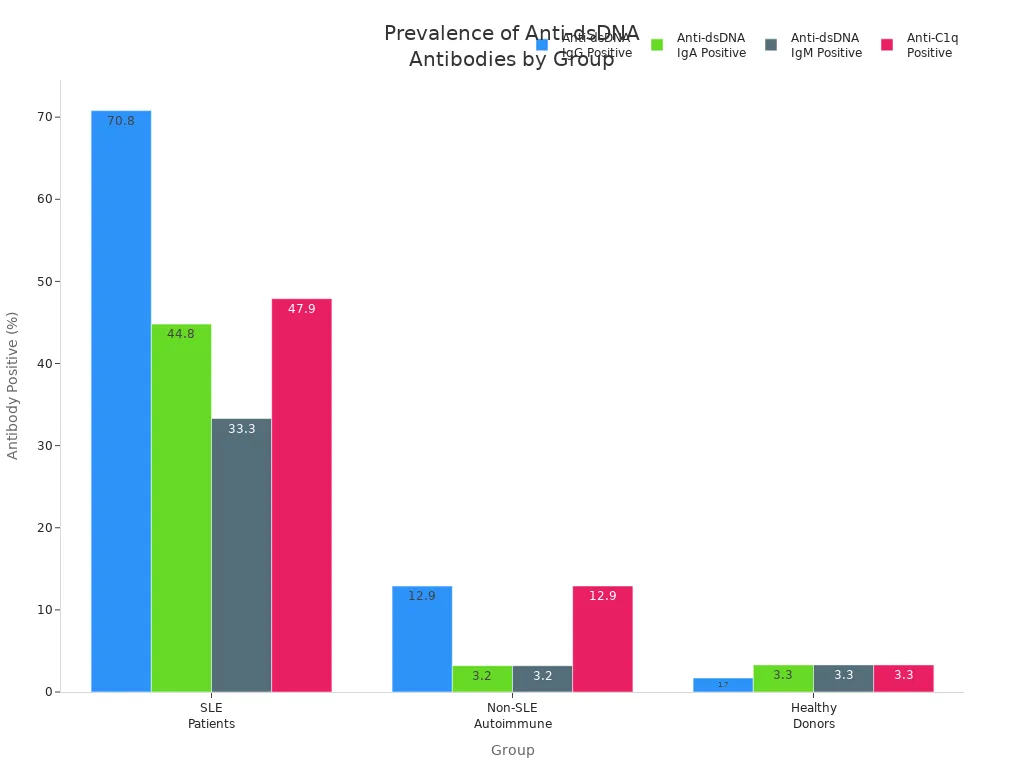
Why It’s Ordered
Doctors order the anti double stranded dna antibody test for several reasons. You may get this test if you have symptoms that suggest sle or another autoimmune disease. The test helps with screening and diagnosis. It also helps track disease activity. Your doctor may use elisa, clift, or other assay methods to get accurate results. The anti-dsdna test is a key part of the diagnostic approach for sle. It has high specificity, which means it is very good at confirming sle when positive. The test also helps doctors follow your results over time and adjust treatment if needed. You may need repeat testing to monitor changes in your antibodies. The anti-dsdna test is included in many diagnostic criteria for sle and other autoimmune diseases.
Tip: Ask your doctor which assay method they use for your anti-dsdna testing. Different methods, like elisa or clift, may give slightly different results.
When Testing Is Recommended
Symptoms and Risk Factors
You may wonder when doctors suggest an anti-double stranded DNA antibody test. Many people get this test because they show signs that point to autoimmune diseases like lupus. You might notice some symptoms that make your doctor think about testing. Here are common reasons for ordering this test:
- Fatigue that does not go away
- Joint pain or swelling
- Skin rashes, especially on your face or body
- Unexplained fever
- No symptoms at all, but other tests or family history raise concern
Doctors often look for these signs because they can appear in people with lupus or other autoimmune conditions. Sometimes, you may not feel sick, but your doctor sees changes in your blood tests. Positive anti-dsDNA antibodies can show up years before you get a diagnosis of lupus. If your antibody levels rise quickly, you may face a higher risk of a severe lupus flare in the next few months.
Note: If you have a family member with lupus or another autoimmune disease, your doctor may pay closer attention to these symptoms and risk factors.
Who Should Get Tested
You should consider anti-double stranded DNA antibody testing if you have symptoms that match those above or if your doctor suspects an autoimmune disease. Doctors recommend this test for people who already have a diagnosis of systemic lupus erythematosus (SLE). The test helps track how active your disease is. You may also need testing if you have other autoimmune conditions that show antinuclear antibodies in your blood.
Doctors use this test to help confirm a diagnosis and to monitor changes in your health. If you have a positive ANA test or unexplained symptoms, you may be a good candidate for anti-dsDNA testing. Your doctor will decide if this test fits your situation based on your symptoms, medical history, and other lab results.
| Who Should Get Tested | Reason for Testing |
|---|---|
| People with lupus symptoms | To confirm diagnosis and monitor disease activity |
| Patients with positive ANA tests | To help clarify the cause of abnormal results |
| Those with family history of lupus | To check for early signs of autoimmune disease |
| Individuals with other autoimmune diseases | To rule out or confirm lupus involvement |
Tip: Talk to your doctor if you notice new symptoms or changes in your health. Early testing can help you get the right care and avoid complications.
Interpreting Anti-Double Stranded DNA Antibodies Results
Understanding your anti double stranded dna antibody test results can help you and your doctor make better decisions about your health. The clinical relevance of anti-dsdna antibodies depends on the value, the method used, and your symptoms. You should always look at these results together with other clinical criteria and laboratory findings.
Positive Results
A positive anti-dsdna result means your blood has higher levels of antibodies that target your own DNA. Doctors often use this as a key biomarker for the diagnosis of sle. High levels of anti-dsdna antibodies are strongly linked to active systemic lupus erythematosus. These antibodies are rare in healthy people, so a positive result has high clinical significance for lupus.
You can see the reference ranges for anti-dsdna results in the table below. Different labs may use different cutoffs, so always check your report.
| Result Type | Reference Range |
|---|---|
| Normal (Negative) | < 10 IU/mL |
| Equivocal | 10 – 15 IU/mL |
| Positive | > 15 IU/mL |
| Result Type | Reference Range |
|---|---|
| Negative | < 27 IU/mL |
| Borderline Positive | 27 – 35 IU/mL |
| Positive | >= 36 IU/mL |
If your anti-dsdna level is above the positive range, your doctor may use this information as part of the diagnostic approach for sle. The clinical relevance increases if you also have symptoms like joint pain, skin rashes, or kidney problems. The anti-dsdna test is one of the main clinical criteria for lupus diagnosis. High levels often mean your disease is active, especially if you have other signs of autoimmunity.
The table below shows how anti-dsdna levels compare between healthy people and those with sle:
| Parameter | Anti-dsDNA Levels (IU/mL) | Significance |
|---|---|---|
| Control Group Mean | 22.03 ± 17.20 | |
| SLE Patient Mean | 133.20 ± 100.50 | P < .0001 |
People with sle usually have much higher anti-dsdna levels than healthy people. High levels also link to musculoskeletal symptoms and other autoantibodies. Doctors use these results to track disease activity and guide treatment.
Note: High anti-dsdna levels can also appear in other conditions. Some rheumatological disorders, infections, and cancers may cause a positive result. The chart below shows the number of patients with positive anti-double stranded dna antibody tests in different conditions.
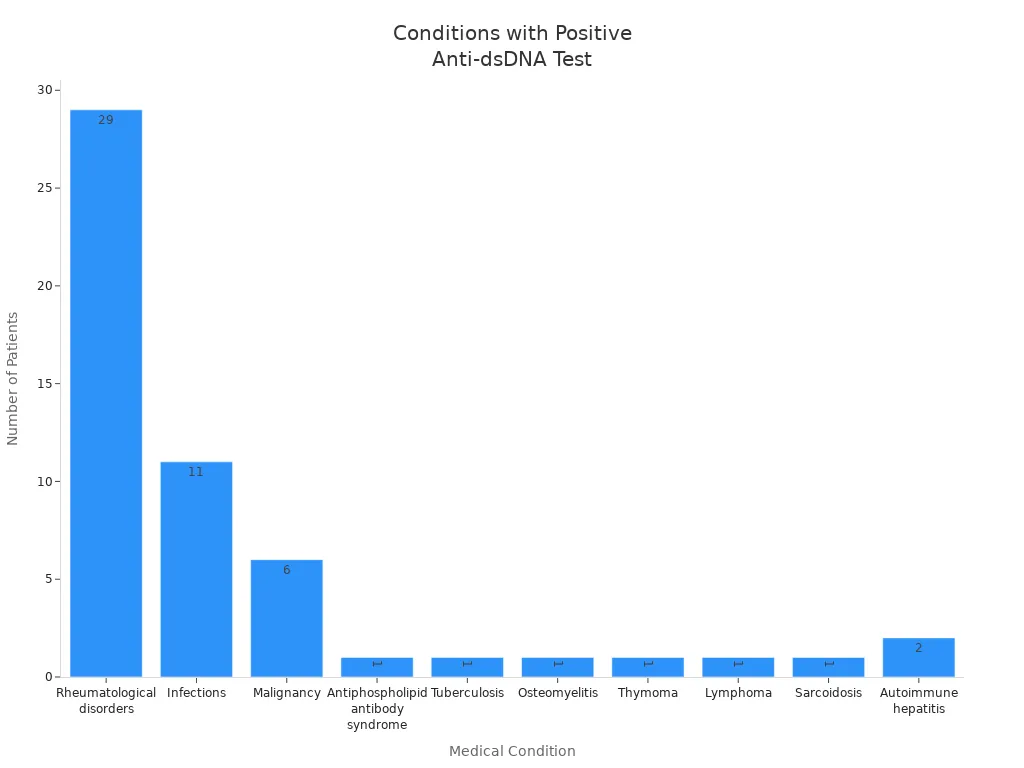
| Medical Condition | Number of Patients | Percentage |
|---|---|---|
| Rheumatological disorders | 29 | 33% |
| Infections | 11 | 12% |
| Malignancy | 6 | 7% |
| Antiphospholipid antibody syndrome | 1 | N/A |
| Tuberculosis | 1 | N/A |
| Osteomyelitis | 1 | N/A |
| Thymoma | 1 | N/A |
| Lymphoma | 1 | N/A |
| Sarcoidosis | 1 | N/A |
| Autoimmune hepatitis | 2 | N/A |
Some testing methods, like elisa, may give false positives. This can happen if immune complexes bind to the test plate. Patients with inflammatory arthritis who use biologics may also show false positive anti-dsdna results. The clift and farr assay methods are more specific and can help confirm the diagnosis.
Tip: Always ask your doctor which assay was used for your anti-dsdna test. Elisa, clift, and farr assay each have different strengths in detecting autoantibodies.
Negative or Borderline Results
A negative or borderline anti-dsdna result means your antibody level falls below the positive range. This can be reassuring, but it does not rule out sle or other autoimmune diseases. The clinical significance of a negative result depends on your symptoms and other test results.
- A negative or borderline anti-double stranded dna antibodies test does not rule out sle.
- About 30-50% of people with sle may have a negative anti-dsdna result.
- The anti-dsdna test is specific for sle and is not usually positive in other autoimmune disorders.
The sensitivity of the elia dsDNA assay is about 38%. This means many people with lupus may test negative. The anti-dsdna-ncx elisa has a sensitivity of 51%, so nearly half of sle patients could have negative or borderline results. Some patients may even have borderline results on certain assays, such as elia dsDNA.
You may see your result listed as “equivocal” or “borderline” if it falls between the normal and positive ranges. Doctors use clinical criteria and other laboratory tests to decide if you meet the diagnostic criteria for sle. The clinical relevance of a negative or borderline result is lower, but your doctor may still consider other signs of autoimmunity.
Note: If you have symptoms of lupus but a negative anti-dsdna result, your doctor may order more tests or repeat the anti-dsdna test using a different assay, such as clift or farr. The clinical applications of these tests help guide the diagnostic approach and treatment plan.
Changes in your anti-dsdna levels over time can also have clinical significance. Rising levels may signal a flare of active systemic lupus erythematosus, while falling levels may show improvement. Your doctor will use these results, along with other biomarkers and clinical criteria, to monitor your disease.
Anti-Double-Stranded DNA Antibodies in Context
Other Tests and Symptoms
You should always look at your anti-dsdna results together with other laboratory tests and your symptoms. Doctors use several tests to help with the diagnosis of sle and to confirm the presence of autoantibodies. Anti-dsdna antibodies are important, but they do not act alone. You may see tests for anti-Sm, anti-U1RNP, anti-Ro/SSA, and anti-La/SSB antibodies. These tests help doctors meet diagnostic criteria and improve screening for autoimmune diseases. The table below shows how often these antibodies appear in lupus and healthy people.
| Test Name | Description | Specificity for Lupus | Incidence in Lupus Patients | Incidence in Healthy Individuals |
|---|---|---|---|---|
| Anti-Sm | Found almost exclusively in lupus; present in 20% of lupus patients. | Low | 20% | <1% |
| Anti-U1RNP | Commonly found with anti-Sm; present in ~25% of lupus patients. | Low | ~25% | <1% |
| Anti-Ro/SSA | Found in 30-40% of lupus patients; associated with certain conditions. | Moderate | 30-40% | ~15% |
| Anti-La/SSB | Similar to Anti-Ro; present in lupus and Sjogren’s syndrome. | Moderate | 30-40% | ~15% |
You may notice that anti-dsdna antibodies have higher specificity for systemic lupus erythematosus compared to other autoantibodies. Doctors use elisa, clift, and other assay methods to measure these antibodies. Your symptoms, such as joint pain or skin rashes, help guide the diagnostic approach. The chart below compares the incidence of lupus antibody tests in patients and healthy individuals.
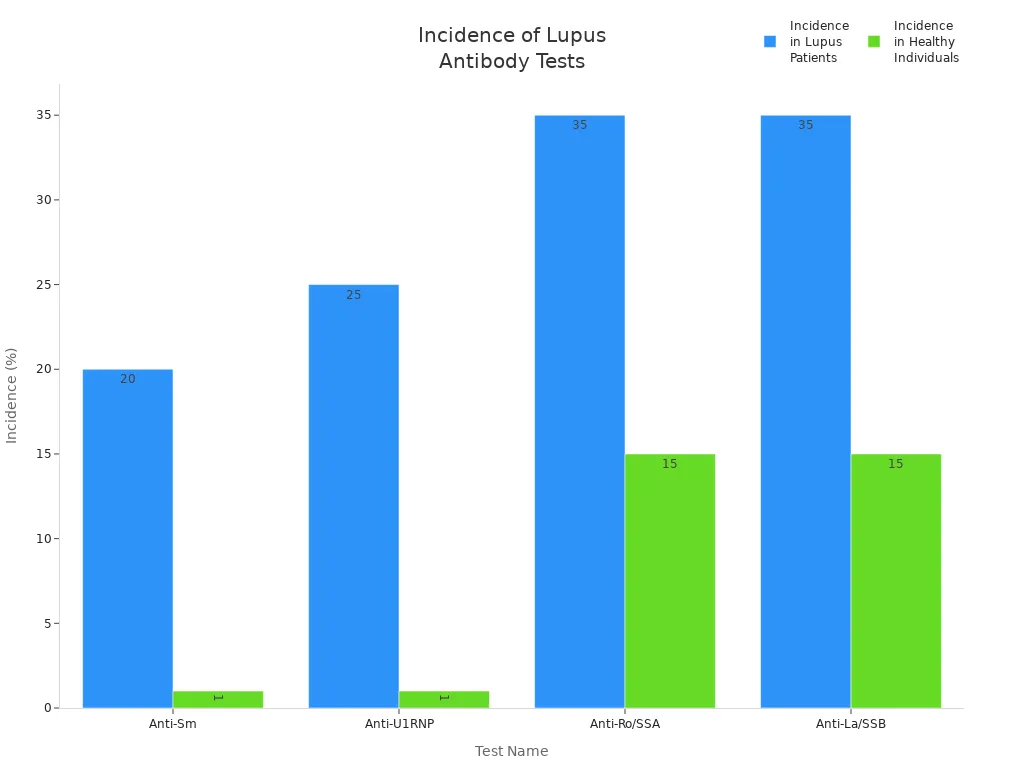
Note: Your doctor may order multiple tests to meet diagnostic criteria and confirm the diagnosis. You should share all symptoms and changes in your health during screening and testing.
Monitoring Disease Activity
Doctors use anti-dsdna results to track lupus flares and remission. You may see your anti-dsdna antibodies rise before a flare. Fluctuating anti-dsdna levels often signal changes in sle activity. About 75% of patients show an increase in anti-dsdna levels greater than 0 IU/ml per year. Nearly 80% have an increase greater than 0% per year. These changes help doctors adjust treatment and monitor disease progression.
- Rising anti-dsdna levels may warn of a lupus flare.
- Fluctuating anti-dsdna antibodies often mean active sle.
- Doctors see a strong link between anti-dsdna levels and SLEDAI scores, especially in renal lupus.
You should have anti-dsdna testing every one to three months if you have active sle. Doctors use elisa, clift, and other assay methods to measure changes in antibodies. These results help guide treatment and meet clinical criteria for monitoring. Your doctor may repeat testing to check for improvement or worsening of your disease. You should always discuss your results and symptoms with your healthcare team.
Tip: Regular monitoring of anti-dsdna antibodies helps you and your doctor manage sle and prevent complications. You should keep track of your results and report any new symptoms.
Next Steps After Your Results

If Positive
If your anti-dsdna test comes back positive, you should know what happens next. Doctors often consider sle as the main diagnosis when you have symptoms and a positive anti-dsdna result. This test is more specific for sle than other tests, so it helps confirm the diagnosis. You may need more tests to check for other antibodies or organ involvement.
- Your doctor will likely monitor your anti-dsdna levels over time.
- You may get regular blood tests to track lupus activity.
- The same method should be used for each test to keep your results consistent.
- High anti-dsdna levels can mean a higher risk of lupus flares or kidney problems.
- Doctors may adjust your treatment if your anti-dsdna levels rise.
| Finding | Description |
|---|---|
| Relationship | A graded relationship exists between anti-dsdna levels and risk of flare in sle patients. |
| Risk Increase | A two-fold increase in anti-dsdna levels means a higher risk of future flares. |
Doctors use these results to guide your care and watch for serious problems like nephritis.
If Negative or Borderline
A negative or borderline anti-dsdna result can feel confusing. You may still have sle, even if your anti-dsdna is low or just above normal. About half of people with sle do not have high anti-dsdna antibodies. Your doctor will look at your symptoms, other test results, and your medical history.
- You may need more tests for other antibodies.
- Doctors may repeat the anti-dsdna test later.
- Your care team will watch for new symptoms or changes in your health.
A negative result does not rule out sle. Your doctor will use all the information to make the best diagnosis.
Talking to Your Doctor
You should always talk with your doctor about your anti-dsdna results. Good communication helps you understand what your results mean for your health. Your doctor knows which immunoassay was used for your test and can explain how it affects your results. Higher anti-dsdna levels often mean more active sle, especially if you have kidney problems or vasculitis.
- Ask your doctor what your anti-dsdna results mean for your diagnosis.
- Share any new symptoms or changes in your health.
- Work with your doctor to make a plan for follow-up and treatment.
Tip: Keep a record of your anti-dsdna results and symptoms. This helps you and your doctor track changes and make better decisions.
Understanding your anti-dsdna test results helps you manage sle and improve your health. You should know that anti-dsdna antibodies play a role in tissue damage and inflammation. Many patients think a positive anti-dsdna test is needed for sle diagnosis, but other antibodies matter too. You may see discordant anti-dsdna results between different assays, which can affect your care.
- Anti-dsdna sensitivity in sle is about 60%.
- High anti-dsdna levels can signal active sle, but low specificity may cause confusion.
- Anti-dsdna antibodies activate inflammatory cytokines and impact disease progression.
- Discordance between anti-dsdna assays occurs in up to 20% of patients.
| Risk | Percentage |
|---|---|
| Discordant anti-dsdna positivity | 20% |
| Discordant anti-dsdna titres | 40% |
You should always talk with your doctor about anti-dsdna results and symptoms. Never make health decisions based only on anti-dsdna numbers. Your medical team can help you understand sle, antibodies, and diagnosis. You have support and resources to guide your care.
FAQ
What does a positive anti-double stranded DNA antibody test mean?
A positive result shows you have antibodies that attack your own DNA. This often points to lupus. Your doctor uses this result with your symptoms and other tests to confirm a diagnosis.
Can you have lupus with a negative anti-dsDNA test?
Yes, you can. About half of people with lupus have negative anti-dsDNA results. Your doctor looks at other antibodies and your symptoms to decide if you have lupus.
How often should you get tested for anti-dsDNA antibodies?
Doctors usually recommend testing every one to three months if you have active lupus. Regular testing helps track changes in your disease and guides your treatment plan.
Do high anti-dsDNA levels always mean a lupus flare?
High levels often signal active lupus, especially kidney problems. However, not every increase means a flare. Your doctor checks your symptoms and other lab results before making decisions.
Can other diseases cause a positive anti-dsDNA test?
Yes. Some infections, cancers, and other autoimmune diseases can cause positive results. Your doctor uses other tests and your medical history to find the true cause.

